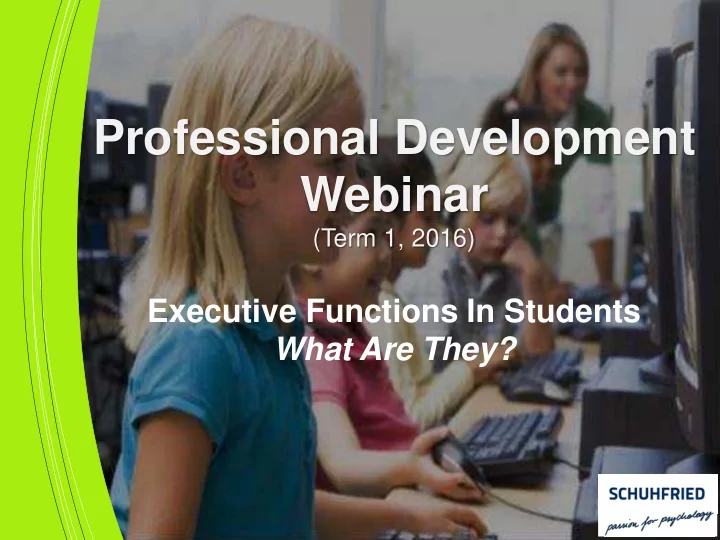

Professional Development Webinar (Term 1, 2016) Executive Functions In Students What Are They?
Executive Functions Foundations Cognitive foundations of Learning Executive Attention Memory Functions
Executive Functions Higher Order Functions Cognitive Functions Problem Solving Planning Reasoning Impulse Control Successful Highly application interrelated requires coordination Cognitive Working Flexibility Memory
Executive Functions Importance Life Area Importance of Executive Functions School readiness More than IQ or entry-level reading or math School success Predicts math, reading and writing competence Quality of life Better quality of life Job success Productivity, finding and keeping a job Marital harmony Harmony, dependability and reliability Physical health Healthy weight, eating and following medications Public safety Reduced social problems Attention deficit hyperactivity (ADHD), Depression, Obsessive Mental Health compulsive disorder (OCD)
Executive Functions Self-Control Self- Executive Regulation Functions Emotional, Motivational & Cognitive Cognitive Ability Arousal Self-directed Thoughts Willpower Attention Action
Inhibition Control Attention - Thoughts - Behaviour External Lures and Distractions Learning Internal @#$%@$ Change State & Inclinations Choice
Inhibition Control Over Control Over Interferences Interferences Inhibition over attentional Interferences and distractions Suppression of unwanted thoughts Control over Control over ideas and memories Responses Responses Control over behaviour Delaying Resisting temptations Gratification Not acting impulsively
Inhibition What happens with poor inhibition control? Students become very impulsive in themselves, their minds and their behaviour. High levels of learning interference occur, both at the perceptual level and cognitive (thoughts) level. Responses become uncontrolled and thinking appears “thoughtless”. Cognitive Wait Time Reduce Need for Self- Control Mental Effort
Working Memory Holding Processing information Verbal working memory Processing Nonverbal (or visual-spatial) Mentally working memory processing information
Working Memory Links with Inhibition Concentrate Working memory Supports Inhibition Stop mind wandering Inhibition Supports Working Memory Principle of Upfront “stopping” learning goals & cues Monitoring of memory contents
Cognitive Flexibility Switching Making tasks changes Thinking Shifting “outside perspectives the box” Resetting priorities Cognitive Flexibility
Executive Functions Getting More Out Of Executive Functions Learning something new requires the pre-frontal lobe Well developed skills or integrated knowledge Task mastery Deliberate Limit top-down repeated conscious practice control of performance
Executive Functions What hinders executive functions? Executive functions suffer FIRST and MOST! Interests engaged Don’t ignore Rested and stress healthy
Training and Practice: Improving Executive Functions • Executive function development • Strongest evidence : cognitive needs to be continuous and training, thinking strategies, incremental . exercise, mindfulness, yoga, early childhood development. • Repeat practice is the key, but • Childern with poor executive needs to be embedded in classes. functioning improve the most. • The largest differences observed • Early executive function when executive function tasks are demanding and occur over diagnosis and training longer periods of time. important. • Executive functions can be • Computerised cognitive improved at any age . development can work , but transfer is narrow. But hope for better designed programs.
Summary Executive functions: 3 key areas • Self-control and inhibition are critical for learning • Working memory makes it possible engage thinking and consolidate learning • Cognitive flexibility is essential for adaptability Executive functions support academic achievement • Know the level of executive functioning capability of students • Monitor for loss of executive functions • Adapt teaching methods Executive functions are trainable • Can be improved at any age - probably by many different approaches • Help young children have good executive functioning for lifelong benefits Executive functions are dynamic • Executive functions suffer first and quickly if students stressed, tired or unfit • Repeated practice is key • It is not always beneficial to consciously control executive functions for well developed skills
Free Resources 1. Webinars www.neuromite.com.au/webinar s • Professional Development • NEUROMITE programs 2. NEUROMITE web site www.neuromite.com.au 3. Free Subscription www.neuromite.com.au/school-resources-login • School Resource Centre online • News updates (e.g. webinar invitations)
Recommend
More recommend